If you check my RedState bio you will find this: “Brittany was strong and early opposition to CA’s AB 5, co-authoring an Assembly ethics complaint and going on to write an economic bill for independent contractors in Nevada.” If you read my Twitter bio, you will see that I posted my proudest blocked-by list and while none of that may mean anything to you, I frequently get a new follower who comments, “You had me at blocked by Lorena Gonzalez.” Gonzalez was the author of California’s anti-freelancing bill, AB 5, and now is the Executive Secretary-Treasurer of the California Federation of Labor… which is embroiled in anti-black racist scandals in Los Angeles and proxy-wars, currently.
I didn’t live in California at the time the bill that devastated the livelihoods of the state’s freelancing and the independent contracting workforce was introduced and passed, even while I began a multi-year, multi-state march against it. My AB 5 opposition was about millions of others; it wasn’t about me at the time the ethics complaint was drafted, raising the voice of a proponent’s personal exploitation leading up to the key testimony given in the labor committee. The purpose of telling you about my own efforts is simply due to the fact the subject matter can be fact-intensive. I had a blog on independent labor but as it turns out, labor law isn’t a popular American pastime. The best way I can speak to the issue and past, present, and future ramifications is through my own voice, while I assure you it was never about me.
My message to Nevadans is that the threats to economic freedoms and prosperity are being underestimated in our state. To the credit of the people in our state, the fingerprints of Marxism on social issues do not go unnoticed. Nevada’s conservatives, nonpartisans, and even some moderate Democrats do see and oppose cultural Marxism, class warfare, and identity politics. They oppose it in our legislature and at our school board meetings. But, I do think the economic aspects of the steady march to socialism are going unnoticed. From a first-generation Cuban-American perspective: If we aren’t talking about the economics of socialism, then we aren’t talking about socialism at all.
It is my own personal estimate that independent contractors account for about 300,000 members of Nevada’s workforce. We have no state income tax, so taxpayers do not report to the state. This number is based on a slight increase of the national average given entertainment sectors, metropolitan frontiers of the “gig economy” and numbers claimed through the state’s Pandemic Unemployment Assistance program. The worker classification issue is desperately important at a time when we still serve as the nation’s canary in the coal mine for economic downturns with our tourism-based economy. Simply put, as ideas of California-esque worker criteria seep into the state from many angles, the threat they bring is far too quiet and consequential.
PRO Act
One of the ways California’s experiment on livelihoods and business models can find its way into neighboring Nevada (and every state) is through the federal government, and they already tried. The PRO Act legislation would undo over 70 years of labor law in America. I will not bore you with the intricacies of how the law would nullify Right to Work nationally, how “unfair labor practice strikers” can cost your business a fine of $50,000 levied by federal bureaucrats each time you “misclassify” or tell them they are an independent contractor who can’t “strike,” how independent entities getting together to price-fix in an industry is also known as anti-trust, or how anyone with a legal team just wouldn’t work with independents once they read the law over. Just know that I read the bill in its entirety, highlighted, drew arrows, and cross-referenced, and those were my conclusions. Also, all of that could be avoided because anyone who wants to file a wage claim can do so.
RedState’s team of contributors has done some of the best, most consistent, and most comprehensive reporting in existence on AB 5 and its devastating impacts. When the PRO Act was in the Senate, RedState ran a guest piece on my opposition to President Joe Biden’s Department of Labor (DOL) Deputy Secretary appointee, California’s Julie Su:
‘From State Shakedowns to Federal Syndicate’, California’s Extortion Racket Goes National
As the “misclassification” criteria from California’s AB5 is poised to impact the nation through the PRO Act, its weaponizers follow suit: from state shakedowns to federal syndicate. This kind of institutionalized opportunism, prioritized over helping people, is exactly why Americans should be spared from this racket by voting down both Ms. Su’s appointment and the PRO Act in the Senate.
When the PRO Act came along threatening to spread the cancerous ABC test restricting worker classifications in California to the entire nation, the anti-AB 5 groups found themselves campaigning in direct opposition to the Democratic Socialists of America (DSA), brought into the fold of union groups like the AFL-CIO, and their shadow affiliate proxies. Do not be mistaken: DSA declared this bill their top priority, launching the biggest contact campaign they have ever done. They targeted hold-out Senator Kyrsten Sinema (D), including holding protests outside of her office, and used political clout to threaten vulnerability in re-election.
Everyone should be fighting for the PRO Act. We only need to work on 3 more Senators: Mark Warner (VA), Kristen Sinema & Mark Kelly (AZ). pic.twitter.com/iw1r608vzD
— Amanda Nichols (@saidthegadfly) April 20, 2021
We owe a lot to the Californians who already knew the issue and raised their voices and to the moderate Democrats who did not comply with the party line or threats to unseat them. But, because Nevadans were never devastated by these policies, few saw and understood the implications. No thanks to our sitting Democrat Senators, Nevada and other states were unwittingly spared while never knowing who the heroes were. For independent contracting proponents, the relief was never held in sincerity: This was far from over.
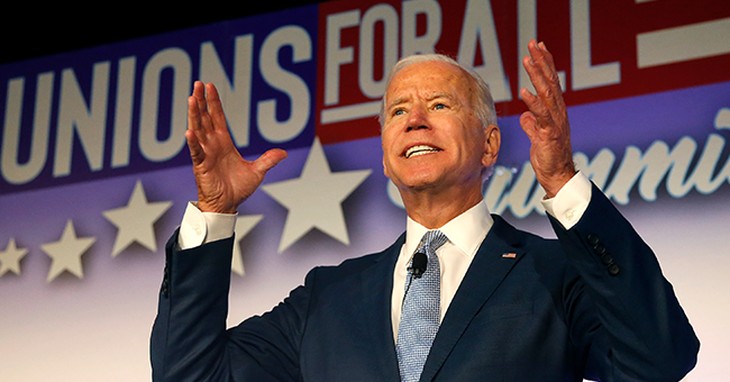
In turn, leftist think tanks and whoever is play-calling the platforms for the Biden Administration (the most pro-union admin of all time, right?) fractionalized the bill and sent it in many different directions. If they couldn’t get it done in the Senate they would add provisions to other bills under the Build Back Better (with unions) guise, and through regulatory rulemaking at the DOL. The latter is what we are faced with today, as reflected in the federal register, a public comment period on a proposed rule is currently open. I implore Americans to submit a public comment before Thanksgiving.
Under Trump Admin
The Trump administration had a DOL rule for independent contractors that was slated to take effect in the spring of 2021. The incoming Biden administration put all upcoming rules from its predecessor on ice, and to nobody’s surprise, the Trump rule never saw the light of day. In Nevada, the former California State Senator, Jeff Stone (R) is on the ballot for State Senate, District 20. After the Democrat majority’s crown-jewel AB5 was passed in 2019 to which he gave gallant opposition, Stone left the legislature because he was appointed by Trump as a Regional Director at the DOL.
Of the Trump-era rule for independent contractors, Stone tells RedState,
“It was a good rule that was fair, it didn’t have parameters like the test in California where independent contractors don’t fit in the mold.”
We discussed the effects of an unstable regulatory environment, causing wildly different rules to affect the way people work, do business, and even union organizing with every administration change. Stone comments that the incoming rules can be reversed by a Republican Congress and President in 2024. He agrees that regulatory instability is an issue that affects economics, saying,
“It should be harder to regulate. I also believe these regulations should be codified by Congress, not come up with rules willy-nilly that impact economies.”
AB 5’s Unsung Hero
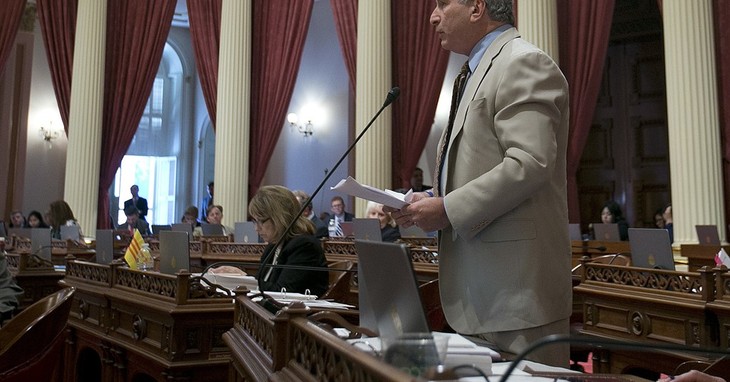
When we revisited the root of the spreading atrophy of AB 5, Stone asked me if I had ever seen his floor speech in opposition to the bill. I laughed, admitting parts of the hearing were on my YouTube channel. I didn’t make mention that I was possibly the only Nevadan who tuned in to watch it live, in the middle of the night, while taking notes as fast as I could. I transcribed his words as he said them in real time. To me, his floor commentaries reign immortal. I can quote parts of that speech: He called it “a Christmas tree for the labor unions” and said that they might as well have an office in the Capitol. Stone’s opposition speech is locked in memory because he was the only person to take them to task, in as brazen a tone as the language spoken by those who crushed Californian’s dreams and will never muster an apology for it.
Stone isn’t “anti-union” as he owned some pharmacies that were unionized workplaces. The bill, tactics, and overarching power structures behind it were just… that bad. The arguments for it were disingenuous and the ramifications were real. This is the worst kind of political theater.
He recalls that one constituent had to sell a chain of hair salons where stylists worked as independent contractors; unable to hire them all as employees.
“It had dramatic effects on independent contractors throughout the state. AB 5 had a lot of unintended consequences.”
When Stone says “unintended consequences” he likely meant that everyone in the Senate GOP caucus, including himself, was sounding the alarm in a marathon of proposed amendments to mitigate the clearly foreseeable harms while the Democrats were in a partisan lock-step of willful ignorance.
Stone says the law was aimed at rideshare platforms, but that the AB 5 proponents couldn’t make a law for a single industry. In the end, the rideshare industry would run the most expensive ballot measure in state history, basically exempting themselves from the provisions of AB 5. The consequences to most other industries were ultimately not as “unintended” as they were Democrat-approved collateral damage. Admittedly, even Republicans were surprised by some of the fallout: “Dismantling an industry of seasonal Santa Claus performers in shopping malls” was not on my AB 5 Bingo card.
With their aims on an industry they would ultimately fail to capture for unionization, the Democrats’ gift to Big Labor cast a wide net while nixing all GOP amendments in the final hearing proposed to protect journalists, nonprofit organizations, and many others. According to Stone, the exemptions in the final draft of the bill (doctors, lawyers, consultants– you guessed it) represented Democrats reaching a critical mass of satisfying enough constituencies to overcome the soon-to-be reeling individuals and industries. This is what the Democrats call a consensus. In any type of Republican ideology, this is what is called picking winners and losers.
The callous and reckless passage of the bill would result in a blitz of exemptions coming throughout the next legislative session, in “clean-up” bills. There are over 100 industry exemptions on the law now. (If your law doesn’t work for over 100 industries… it’s a bad law.) Priority was given to those with good associations or lobbies, connections to the Democrat establishment, and sometimes the squeaky wheel. This is apparent with how quickly journalists got an initial (and seemingly still unconstitutional) carve-out, as even the leftist California media circuit kept writing stories about how the law damaged their careers, publicly levying criticisms, and investigating the political playbooks. Freedom of the press was again re-gifted with political pull from personally-afflicted Willie Brown (D), the former San Francisco Mayor who found out his weekly column wouldn’t run.
But Newsom on Friday took action that will assist his former mentor by signing AB 2257, a bill passed by the Legislature in the final hours of the legislative session Monday to address the concerns of freelance writers, photographers and musicians who said their livelihoods were at danger. The bill takes effect immediately because it was written as an urgency measure and received two-thirds support.
“I signed the bill, write the damn column!,’’ Newsom wrote to Brown in a text message that Brown shared with POLITICO.
Earlier in the day, some of Brown’s powerful friends in politics, including attorney Joe Cotchett, contacted Newsom in an effort to get him to move quickly on the bill to get Brown’s Sunday column back in the paper as soon as possible, sources said.
While AB 5 proved itself to be bad legislation with criteria that plainly does not work, leaving some industries to jockey for importance, some tech companies to self-super-fund their voter-approved exemptions, and some small businesses to suffer hardly recognized demises amid the political cover provided by of the following year’s pandemic closures, and the owner-operator trucking industry filing for injunctions grid-locked in legal battles at the highest levels, other independent contractors simply fled the state.
Nevada
Independent contractors find little peace as the issue is becoming federalized, and the neighboring state of Nevada considers following suit with commissioned studies, a law creating a state board on misclassification, and a recently revealed bill draft title drawing eyes for next year’s legislative session. Meanwhile, the embattled Senator Catherine Cortez Masto (D), challenged by Adam Laxalt (R), was making nice with Gonzalez on the campaign trail in Reno, ready to rubber-stamp the initiatives. On the weekend visit of Gonzalez to Masto in the Silver State, Stone says,
“She is coming in to bolster union awareness, trying to invigorate their union memberships, to rebuild a coalition, and trying to show union solidarity at a time of union strife. It’s a close election, Laxalt can win this thing, but the race for Senate is still tight.”
Even in light of AB 5’s author appearing in the state, Stone is optimistic that a similar bill will not come to fruition. Nevada is not California and Stone knows it. Along with Nevada being a Right to Work state, he finds other contrasts that result in such a law being unfavorable, saying,
“Nevada has no payroll tax, union membership could increase, but I don’t think this is a hill they are willing to fall on when there are more important issues. If it’s like AB 5, I think it gets killed; it doesn’t get out.”
Stone has his own intentions for the economics of Nevada,
“I’m trying to market Nevada as pro-business. We don’t have a state income tax or onerous burdens on businesses.”
His current aims are to help candidates secure a Republican majority in the upper chamber of the state legislature. In doing so, he has become a favorite of rank-and-file Republicans and local conservative pundits to lead the GOP in the state senate. While a fan-favorite for his experience, a lack of engrained party faction rivalries, and overall even-keeled demeanor, Stone is not vying for a leadership position. Stone says,
“I’m doing my best to help candidates and not discussing leadership with any of them. I’m not throwing my hat in the ring, if I am recruited I’m willing to take it. I will be happy being a Nevada State Senator, as outspoken as I was in California.”
For now, like the rest of the nation, Stone awaits the results of the midterm elections saying, “On November 9th, we will go from there.”
Elections have consequences
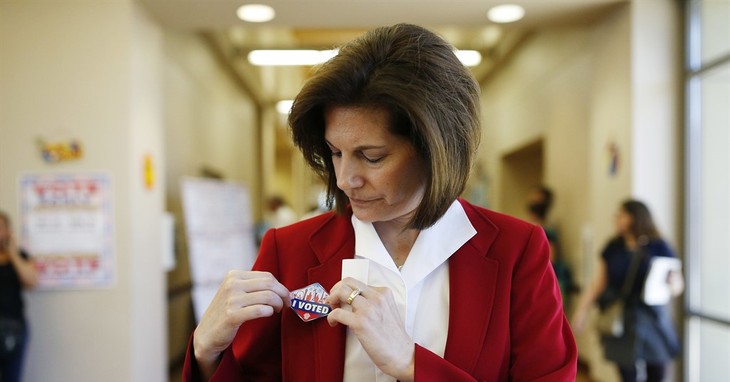
In Nevada, where DSA has taken over the state Democratic Party, forcing factions within the establishment Harry Reid Machine and costing Masto her bid as party chair, the fact that this kind of legislation is a socialist priority slithering its way in, should not be ignored. Frankly, if Masto cannot protect her own ranks from socialist coups, with the advantage of industrial-grade political horsepower known as a “machine,” how can she protect any of us? She doesn’t. Just as the socialists, Gonzalez, and the AFL-CIO would implore her to do, she supports the PRO Act and not the estimated 300,000 Nevadans that would go from self-employed, to unemployed under the pretense of union membership conversion rates… I mean, worker something-or-other.
Wherein, two independent contractors get together, calling it an organizing effort, racking up hundreds of thousands in fines for the entity who contracted with them, and turn the industry over to unionization through a guesstimate and gerrymandered bargaining unit. Yes, that’s somehow the federal plan to save us from self-employment. And, while Masto is uncomfortably flanked by socialists who bested and embarrassed her, thus challenging the Democrat infrastructure, she won’t stand up and say that it’s a stupid idea. But, it’s a stupid idea. Unless your goal is to siphon forced dues (even if stifling the economy) to pay for political activities and fund progressive campaigns, then it’s a mandate on uncontested uni-party power. Which, is also a stupid idea. Just ask the state’s number one voting block: nonpartisan voters.
Stone is right. We will see on November 9th. After that, Nevada will know how they shaped the US Senate which tells us if and when we see the PRO Act again. We will know the makeup of the state legislature that will be considering regurgitated California policy they are tasked with jigsaw-puzzling into a state’s framework that won’t support it. Because, uh oh, the socialists said so.
When Lorena Gonzalez steps foot into this state, she brings with her a threat to our economic safety. When our legislation sounds like she authored it, and when Nevada’s politicians lean on her to get them through and they promise to play nice with socialists’ favored agenda items, Nevadans need to take note.
We can prevent all of it, and we have three weeks to get it done. We can go back to our slumber as if none of this is happening and no such threats exist in massive, coordinated, and well-funded schemes. I can go back to not having to explain the complicated tom-foolery because this is Nevada, not California. Nevadans decide what we wake up to on November 9th: if we step into a play-by-play political prophecy or wake up from a bad dream.
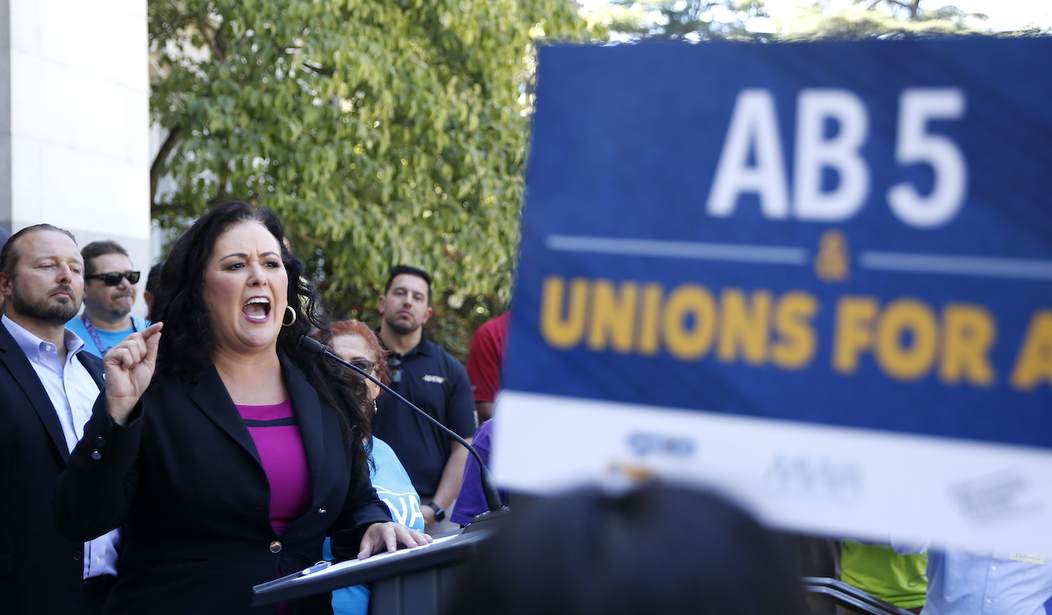
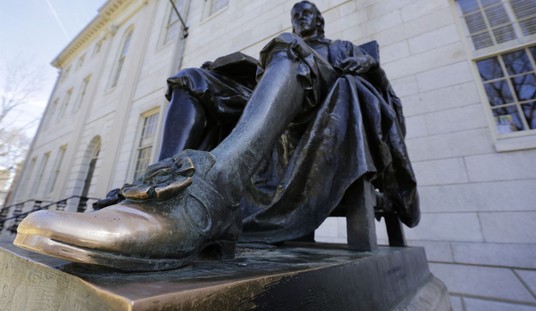











Join the conversation as a VIP Member